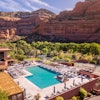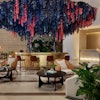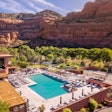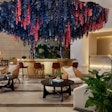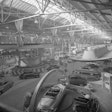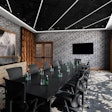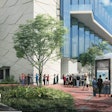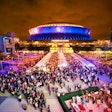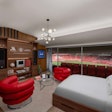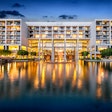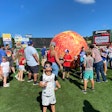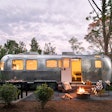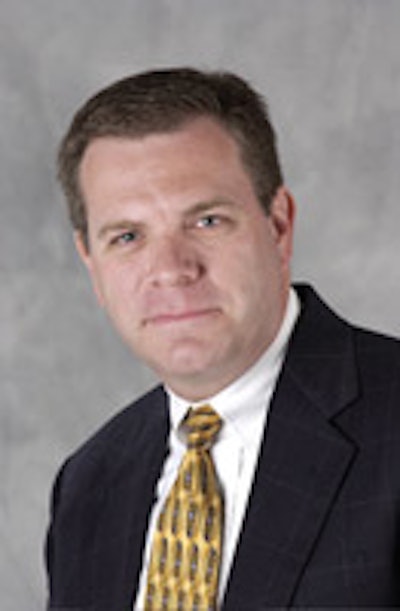
As president and C.E.O. of the Kentucky Derby Festival—the Louisville-based nonprofit organization that oversees two weeks of events leading up to the famous horse race at Churchill Downs every May—Mike Berry handles planning and logistics for some 70 annual events, which range from concerts to a marathon and the Great Steamboat Race. The months leading up to the festival’s kickoff event, a fireworks spectacular known as Thunder Over Louisville that draws an average of 750,000 onlookers, are particularly hectic for Berry and his team. On a rare moment of calm this past Friday afternoon, Berry talked with us about the inner workings of one of the largest community festivals in the country, and how its sponsorships and partnerships are changing.
How do you keep the annual events associated with the Kentucky Derby Festival fresh each year?
We have a process called "events and review" that involves taking a portion of the events and reviewing them by committee each year. Each one gets reviewed about every five years, and we get anonymous reviewers to go to the events and fill out forms. Was the signage adequate? Were merchandise and concessions available? This also gives us an historical reference because they record what the temperature was that day, the crowd size, and other details specific to that particular year. We also change the theme of the festival each year. That means the look of all the printed materials changes, as well as some of the interactive activities at some of the events.
What will be the theme of this year's Festival?
This year’s overall theme is "Road to Fun," which we came up with during a think tank-session with our advertising agency [Louisville-based Current Marketing] and our board. Someone suggested a road-trip theme, and we ended up going with it because it gave us a lot of opportunities. All the talk last summer with $4 dollar gas was about "staycations,” so we decided to play off the idea of giving people things to do while they stay in town. I was asked yesterday in a press conference if I think the economy will hurt festival attendance, but actually I think it’ll be the other way around. People who aren’t traveling on spring break or summer vacations because of the economy may attend more festival events because it’s affordable entertainment.
What are some expensive—but absolutely necessary—elements of this year's festival? And what are some costly elements that are not worth the price?
An example of that is the Thunder Over Louisville event, now in its 20th year. A survey we did in 2001 showed that the festival brings $100 million into the community, and Thunder is responsible for $31 million of that impact. Still, it’s always a challenging event. We never make money on it, and sometimes the loss is in the six figures. But it’s a world-renowned event, a big tourism draw, and the community demands it. The challenge is that with a free event like this, just because the economy is bad doesn’t mean less people will show up. You can’t cut the number of Port-O-Lets, lost-children stations, first-aid compounds, or cleanup efforts. There are only three things you can cut: fireworks, the air show, and sound. We decided we didn’t want to cut sound because it’s so important to the crowd’s enjoyment, so this year there’s a 10 percent cut in the fireworks and air show combined. I don’t think the public will notice it. There are ways of structuring the fireworks so the impact is the same but the number of individual blasts is decreased.
As the economy worsens, how has the nature of sponsorships for Derby-related events changed?
For the last few years, companies were looking for the hospitality aspect of their sponsorship. They were looking for V.I.P. tents, something where they could entertain clients. Or, a company with a sales staff would reward their top performers or have their employee picnic at a festival event. But as those things have hit the chopping block, sponsors are now looking to change from a hospitality opportunity to an opportunity that helps drive customers to their business and product. So they may want to do crowd sampling to get their product or service in front of the most people possible. The good news is we can provide that opportunity as well, so the festival is well positioned to have a little bit of a cushion in an economy where the goals of the sponsors are changing.
What kind of partnerships does the festival form with local businesses?
We have a package sponsorship program that’s very important to our marketing efforts. It brings in a considerable amount of dollars. What we’re hoping to do with this is: If you want to sponsor Thunder, it’s in the six figures. But not every Louisville business can afford to do that. So you can come in and buy a Festival Patron sponsorship for as little as $600. It gives you perhaps some tickets and hospitality ops, as well as branding ops. You can call yourself an official sponsor of the festival, which is nice because our brand awareness is so high. We try not to price anybody out of the market. I’m a big believer in nickels making dollars.
The other thing is a program called Thunder Funder. There are many businesses in the community that do the right thing and realize that their biggest day of sales—especially in the downtown area—is Thunder Over Louisville day. So if they become a Thunder Funder, they'll give back to help fund the show. [One aspect of that program is] McDonald's Thunder Funder, sponsored by McDonald's Restaurants of Kentuckiana. For a sales period of about five weeks, a portion of every 32-ounce soft drink sold at McDonald's goes to Thunder Over Louisville. The drinks come in special cups, and they have a Thunder Meal with tray liners and promo materials. On an average year, we'll get about $90,000 [from the promotion].
How else do you publicize the festival's events?
Lately we’ve explored many new types of partnerships and publicity methods. For instance, we’ve recently started a rotation plan with our four major local TV stations, which is probably unprecedented with an event of this scope. It gives each station the opportunity to be the official broadcaster of the festival events once every four years, but still have responsibilities to promote the festival in the off-years. Each station’s general manager drew for position to determine the order.
How are you using new media to market and promote the festival this year?
This year we’ve totally redone our three basic Web sites and added social media components like Facebook, MySpace, Twitter, and blogs written by our event managers. We’re also using text-to-screen technology so marathon viewers can track the runners.
How do you handle staffing for the many Kentucky Derby Festival events?
Our full-time staff swells to about 30 bodies in the building at this time of year. So we do rely on some seasonal help, but the real trick is volunteers. We use close to 4,000 volunteers annually, and many have volunteered on the same event year after year. There’s an old saying: “You can get people to do anything for a T-shirt.” And we do give T-shirts and certificates of appreciation to our volunteers, but the bottom line is that there’s a real sense of community created by this festival—that’s the reason why they keep coming back.
Correction: The proceeds from McDonald's Thunder Over Louisville promotion are typically $90,000—not $9,000 as previously stated.


